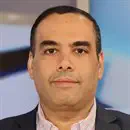
Talks between the National Union and Jewish Home parties reached an impasse overnight, following a marathon negotiating session between representatives of the two factions in the hopes of securing an agreement for a joint run in the upcoming Knesset election.
While the Jewish Home and National Union ran on a joint ticket in both the 2013 and 2015 elections, the two factions remained independent parties.
Both sides have hoped to renew the alliance for this April’s election to the 21st Knesset, but have thus far failed to reach a breakthrough.
Earlier this month, former IDF Chief Rabbi Rafi Peretz was tapped by Jewish Home officials to lead the party – marking his first political run.
Things have not gone smoothly, however, for the political neophyte, with the first attempt at reaching an accord with the National Union breaking down over the weekend.
Peretz later suggested forming a technical block with the Likud – an offer which was later rejected.
While the 63-year-old rabbi and former IDF helicopter pilot expressed optimism Tuesday, suggesting that a joint run with the National Union was inevitable, by Wednesday morning it became clear the two sides had reached an impasse.
Sources involved in the negotiations revealed to Arutz Sheva Wednesday that National Union chairman Betzalel Smotrich has demanded the Jewish Home agree to open joint talks with the right-wing Otzma Yehudit party, for the inclusion of Otzma on a joint list.
Recent polls show the Jewish Home-National Union ticket struggling to cross the 3.25% electoral threshold, with the Otzma Yehudit party also failing to enter the next Knesset. A Joint run of the three factions, however, would win anywhere from 7 to 13 seats, recent polls show.
But Jewish Home leaders are unwilling to include Otzma Yehudit at this stage of the negotiations, and have refused to commit to talks with the party.
Otzma Yehudit, founded by former Kach party activist Baruch Marzel and former MK Michael Ben-Ari, is widely perceived as a continuation of the Kach movement, founded by the late Rabbi Meir Kahane and banned by the Israeli government in 1994.
The Kach party, which won one seat in 1984, called for the transfer of Israel’s Arab population.

